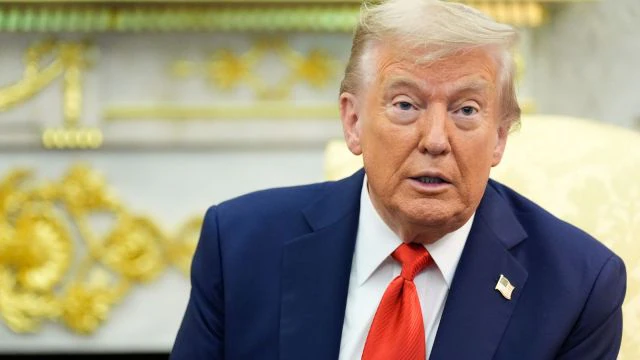Trump’s 50% Tariff Storm: Democrats Warn of Broken US–India Friendship Over Russian Oil

Image via The Indian Express
Washington, August 28, 2025
The political storm in Washington is getting bigger. On Wednesday, President Donald Trump announced additional tariffs on Indian imports. These tariffs, which can go as high as 50 percent, are linked to India’s continued purchase of discounted Russian oil. The move has sparked a wave of criticism in the United States and a sharp reaction from New Delhi.
Democrats in the U.S. House of Representatives say the tariffs are unfair. They argue that the decision is not really about Ukraine or global peace. Instead, they believe Trump is using India as a political target. Many lawmakers now fear that this step could badly damage the U.S.–India relationship, which has been growing stronger over the past two decades.
Why Democrats Are Angry
During a heated discussion in the House Foreign Affairs Committee, Democrats openly slammed the White House. They said Trump is “singling out India” while ignoring other large buyers of Russian oil, especially China.
According to them, China purchases nearly three times more oil from Russia compared to India. Yet Beijing has not been hit with similar tariffs. This, they argue, shows a double standard. Democrats believe the U.S. is risking its friendship with India while giving a free pass to China.
Congressman Gregory Meeks said the new tariff strategy “has nothing to do with peace in Ukraine.” He claimed that the decision is “politically motivated” and could end up hurting American consumers more than anyone else.
What Exactly Trump Did
The policy was rolled out in two steps. First, Trump imposed a 25 percent “reciprocal” tariff on a wide range of Indian products. This was justified by the White House as balancing what it sees as India’s unfair trade policies.
Then came the second step. A new penalty-based tariff was added—another 25 percent—because India continues to buy cheaper Russian oil. Together, these two layers have created an effective 50 percent tariff on many Indian goods entering the U.S.
The tariffs came into effect on August 27, shaking both trade and diplomatic circles.
How India Reacted
In India, the news was received with shock and anger. Prime Minister Narendra Modi, who has enjoyed close ties with American leaders in the past, is reported to have refused recent phone calls from Trump. High-level meetings between trade officials have either been cancelled or delayed.
Analysts in New Delhi say the move will hurt sectors like textiles, gems, jewelry, furniture, and agricultural exports. These industries employ millions of workers. If demand in the U.S. drops due to higher costs, thousands of jobs in India could be at risk.
Yoga guru Baba Ramdev even called the tariff move “political bullying.” He urged people in India to boycott American products, including popular food and beverage brands like Pepsi, KFC, and McDonald’s. His call for boycott gained traction on social media with hashtags trending nationwide.
Economic Fallout
Experts warn the impact could be severe. India exported around $77 billion worth of goods to the U.S. in 2024. With tariffs doubling costs, analysts expect that number could fall by 40 percent or more.
According to a report by NDTV, India’s gain from buying cheaper Russian oil may now be completely erased by the losses in trade with the U.S. In other words, the short-term savings on energy may not cover the long-term economic damage caused by the tariffs.
Former Reserve Bank of India Governor Raghuram Rajan also weighed in. He warned that while Russian oil may look attractive today, the hidden costs are rising. India, he said, needs to calculate whether cheap fuel is worth the price of losing a reliable partner like the United States.
Strategic Concerns
Beyond trade, the move has strategic implications. The U.S. and India have been working closely on defense cooperation, technology sharing, and security in the Indo-Pacific region. The tariffs could weaken this cooperation.
Indian officials point out that the U.S. and European countries continue to import key resources like uranium and fertilizers from Russia. This raises questions about why India alone is being punished.
Democrats in Washington echoed the same concern. They said that such one-sided policies may push India closer to Russia and China at a time when Washington needs New Delhi as a counterbalance in Asia.
Inside the White House
Despite criticism, Trump’s advisors defended the move. A senior White House trade adviser said the tariffs could be removed if India agrees to stop buying Russian oil. He insisted that America cannot allow partners to fund Russia’s war machine.
However, Democrats argue that India’s purchase of Russian oil is more about national energy security than politics. They believe punishing India for this weakens the credibility of U.S. foreign policy.
Voices From India
Indian business leaders have also reacted strongly. The Federation of Indian Export Organisations (FIEO) called the tariff move “devastating.” They warned that exporters of clothing, handicrafts, and agricultural goods will lose their competitive edge in the U.S. market.
Ordinary citizens in India see the development as unfair. Social media platforms are filled with messages calling for stronger self-reliance. Many Indians have shared posts promoting “Make in India” campaigns, encouraging people to buy more local products.
What Lies Ahead
The next few weeks will be crucial. Diplomats from both sides are expected to hold back-channel talks to reduce tensions. Yet, with U.S. elections approaching, many in Washington believe Trump will not roll back the tariffs soon.
For India, the challenge is to balance cheap Russian oil with the cost of losing a major export market. For the U.S., the risk is losing a trusted partner in Asia while sending mixed signals on its global trade strategy.